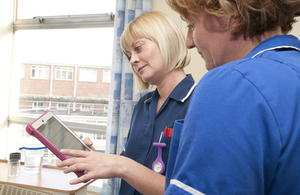New plans to expand the use of digital technology across the NHS
Multi-million pound package to achieve NHS digital excellence in response to Wachter review alongside new digital services for patients.

New plans to fast track digital excellence and improve the digital skills of the NHS workforce have been announced by Health Secretary Jeremy Hunt as part of plans to expand the use of digital technology across the NHS.
Responding to a review of NHS technology conducted by renowned US clinician Bob Wachter, Jeremy Hunt will establish 12 new global exemplars to pioneer best practice and a new academy dedicated to training NHS staff in digital skills.
As global exemplars, the 12 successful NHS organisations will receive up to £10 million and be expected to deliver pioneering approaches to digital services and help others in the NHS to learn from their experience. These trusts will be partnered with an international organisation of their choice, to take full advantage of their expertise.
Alongside investment in technology and infrastructure, the funding will be used to improve training for staff and will also encourage a new generation of chief clinical information officers to drive forward advances in digital technology.
Meanwhile, universities will be invited to host the new NHS digital academy, which will help train NHS professionals in the key skills they will need to deliver next generation, digital healthcare.
Jeremy Hunt said:
Bob Wachter’s excellent review made it clear that digitisation is as much about people as it is technology, and that this is a real opportunity to improve patient care for the long term. We want to fast track existing digital excellence, as well as nurture new skills and expertise that we will need to deliver a new breed of digitised services.
This means on the one hand giving pioneering NHS organisations the financial backing to unleash their full potential, while also making sure that we can build a digitally-confident workforce across the whole NHS.
The global exemplar trusts will be:
- City Hospitals Sunderland NHS Foundation Trust
- Royal Liverpool and Broadgreen University Hospitals NHS Trust
- Salford Royal Hospitals NHS Trust
- Wirral University Teaching Hospital NHS Foundation Trust
- University Hospitals Birmingham NHS Foundation Trust
- Luton & Dunstable University Hospital NHS Trust
- West Suffolk NHS Foundation Trust
- Royal Free London NHS Foundation Trust
- Oxford University Hospitals NHS Foundation Trust
- Taunton and Somerset NHS Foundation Trust
- University Hospitals Bristol NHS Foundation Trust
- University Hospitals Southampton NHS Foundation Trust
Further funding will be available for another 20 trusts to become national exemplars, receiving an intensive programme of support from the new NHS digital academy, and up to £5 million each, to improve how digital technology is used across their organisation.
Digital services for patients
New digital services for patients will enable them to register with a GP, access healthcare records and get medical advice via their tablet or smartphone all in one place. The services, which will be available from the end of next year, are intended to make the NHS easier to use for the increasing numbers of people using smartphones and other mobile devices to access public services.
Speaking at the Health and Care Innovation Expo in Manchester, the Health Secretary will outline the measures for patients, including:
- The expansion of the existing NHS 111 non-emergency phone line service to include a new online ‘triage’ service for less serious health problems – this will enable patients to enter their symptoms online and get tailored advice or a call-back from a healthcare professional according to their needs. The service is being developed with leading clinicians and then piloted to ensure the best patient outcomes.
- NHS-approved health apps to guide patient choice – NHS England will launch a library of NHS assessed apps, as well as advising on other wearable devices, to ensure people can select reputable and effective products to monitor and improve their health.
- A relaunch of the NHS Choices website to improve the range of services - it will be relaunched as NHS.UK with a fuller range of online patient services, including the ability to register with a GP, see and book appointments, and order and track prescriptions.
- Instant access to personal health records online – inspired by the ‘blue button’ app in the US, the new NHS.UK site will also enable patients to securely download their personal health records, giving them instant access to important healthcare information, such as prescriptions and test results.
- More interactive, local information about the performance of health services – from today, the MyNHS website will give better data on how NHS services are performing across dementia, diabetes and learning disability services. Maternity, cancer and mental health data will follow later this year. In future, the revamped site will also include maps, graphs and tools so that patients can see how the performance of their local services has changed over time.
NHS Digital Chief Executive Andy Williams said:
Our purpose at NHS Digital is to harness information and technology to deliver better health and care. That’s why I welcome the Secretary of State’s announcements today and look forward to leading the delivery of better digital services for the NHS and in social care. I am excited by the agenda outlined today and believe we have only just begun to achieve the true transformational change and deliver the real benefits that digital technologies can bring to doctors, nurses, social workers, patients and the public.
Please help us improve our website by taking part in this short survey